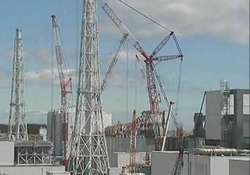Radioactive element found in groundwater near Japan n-plant
Tokyo, June 19: High levels of a toxic radioactive isotope have been found in groundwater near the tsunami-hit Fukushima nuclear plant in Japan, the plant operator said Wednesday.The Tokyo Electric Power Company (Tepco) said tests

Tokyo, June 19: High levels of a toxic radioactive isotope have been found in groundwater near the tsunami-hit Fukushima nuclear plant in Japan, the plant operator said Wednesday.
The Tokyo Electric Power Company (Tepco) said tests showed Strontium-90 was present at 30 times the legal rate, BBC reported.
The radioactive isotope tritium was also detected at elevated levels.
The nuclear plant was crippled by the 2011 earthquake and tsunami that knocked out cooling systems to the reactors, which ultimately melted down.
Water is now being pumped into the reactors to cool them but this has left Tepco with the problem of how to safely store the contaminated water.
Strontium-90 is formed as a by-product of nuclear fission.
Tests showed that levels of strontium in groundwater at the Fukushima plant had increased 100-fold since the end of last year, Tepco official Toshihiko Fukuda said.
He said Tepco believes the elevated levels originated from a leak of contaminated water in April 2011 from one of the reactors.
Tritium was also found at eight times the allowable level.
Fukuda said samples from the sea showed no rise in either substance, and the company believes the groundwater was being contained by concrete foundations.
"When we look at the impact that is having on the ocean, the levels seem to be within past trends and so we don't believe it's having an effect," BBC quoted him as saying.
The Tokyo Electric Power Company (Tepco) said tests showed Strontium-90 was present at 30 times the legal rate, BBC reported.
The radioactive isotope tritium was also detected at elevated levels.
The nuclear plant was crippled by the 2011 earthquake and tsunami that knocked out cooling systems to the reactors, which ultimately melted down.
Water is now being pumped into the reactors to cool them but this has left Tepco with the problem of how to safely store the contaminated water.
Strontium-90 is formed as a by-product of nuclear fission.
Tests showed that levels of strontium in groundwater at the Fukushima plant had increased 100-fold since the end of last year, Tepco official Toshihiko Fukuda said.
He said Tepco believes the elevated levels originated from a leak of contaminated water in April 2011 from one of the reactors.
Tritium was also found at eight times the allowable level.
Fukuda said samples from the sea showed no rise in either substance, and the company believes the groundwater was being contained by concrete foundations.
"When we look at the impact that is having on the ocean, the levels seem to be within past trends and so we don't believe it's having an effect," BBC quoted him as saying.